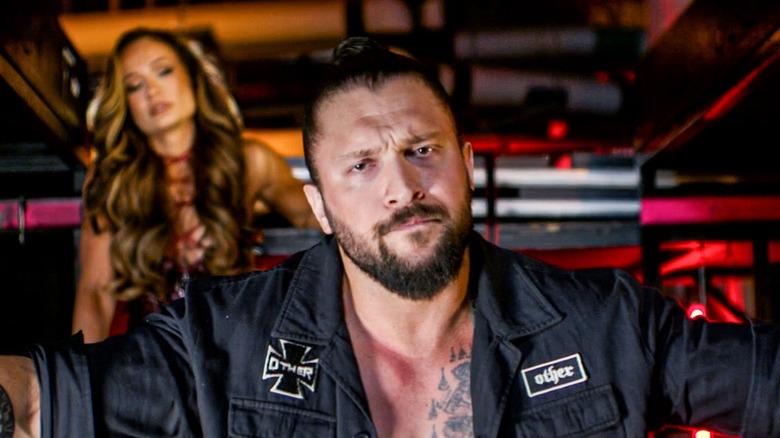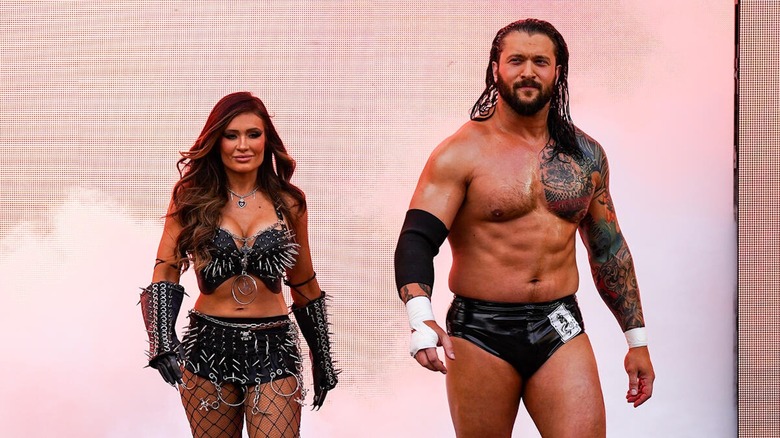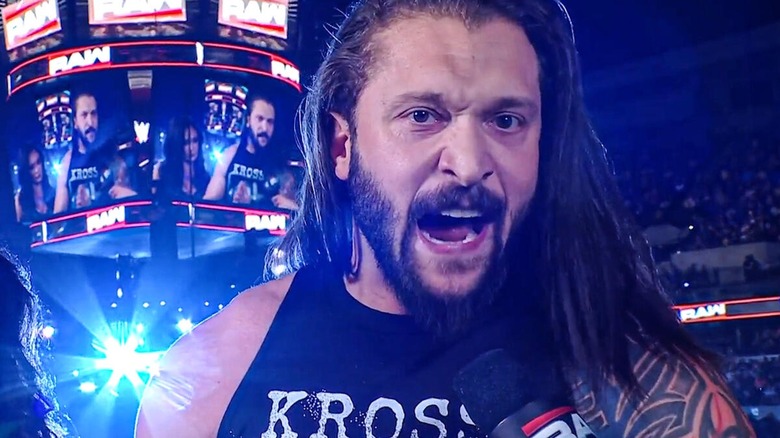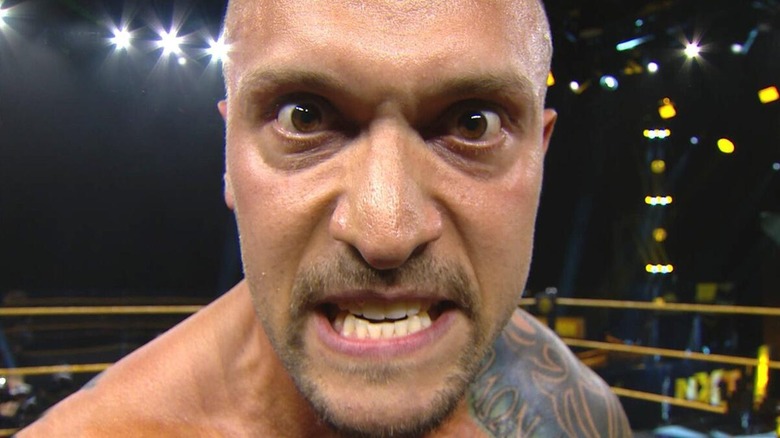Former Karrion Kross Explains WWE Departure Via Detailed Moby Dick Metaphor
The saga of former WWE superstar Karrion Kross' final days with the company, his and Scarlett's eventual exit, the fan response to it all, and what it meant for the future all played out in cryptic fashion during his final months in the company, through promotional appearances surrounding the release of his autobiography, and continues on now, even months after his exit. Deepening the story, the once-and-again Killer Kross has now explained, via his own YouTube channel, how his story metaphorically parallels Herman Melville's classic "Moby Dick," right up until the moment it doesn't, by Kross' own choosing, as he and Scarlett (once more carrying the Bordeaux surname) pave a new path for their future in wrestling.
Framed through the lens of Melville's iconic work, Kross likens his tenure in WWE to the story of Captain Ahab's doomed pursuit of the elusive white whale, only now, with it all seemingly in the past, Kross has let the whale go, knowing that any further pursuit would only end in his demise, much like Ahab. The allegory paints Kross and Bordeaux's post-WWE existence as a conscious break from a cycle they felt doomed to repeat until recently.
While his WWE run began with real promise, the two-time NXT Champion also experienced an infamous repackaging upon his main roster callup, setbacks, renewed hope, a release, a return, and then, most recently, a non-renewal of his contract. For a time, much like Ahab, he saw the payoff he once sought within reach. But before he could be swallowed whole, unlike Ahab, Kross has severed ties and is pressing forward on his own. To understand all that, however, one must backtrack a bit first.
Is it all a work?
For a time leading up to WrestleMania 41, with crowds consistently chanting "We want Kross!", it seemed like he might get his share of the shine from wrestling's biggest event. Instead, all he got was a cameo in the Logan Paul/AJ Styles match, and then the muddying of the waters began. In an impromptu promo on the WrestleMania postshow, Kross got everyone talking and more importantly, wondering if the frustrations expressed were a work or a shoot. That uncertainty only furthered when the spot led to backstage heat that led to Kross having to clear the air with WWE Chief Content Officer Paul "Triple H" Levesque. Though everything was said to have been smoothed over, the contracts of both Kross and Bordeaux expired on August 10, 2025, but that didn't do much in terms of quelling the rumors of it all being part of some extravagant work between all parties involved.
Ensuing appearances on "Insight With Chris Van Vliet" and "The Ariel Helwani Show" featured both hosts inquiring as to whether or not the workers were still, in fact, working, and though Kross insisted that they certainly were not, few bought in, even as independent appearances increased and nothing ever pointed directly toward a WWE return.
In his YouTube explanation, Kross stated, "Everybody wants an answer to the one question, 'Is this all a big work?' Is that what you're asking me? Is this a work? Is this a big, elaborate, intricate work, where I come back and I say, 'Surprise!'? And this business is funny because many would tell you it's all one big work. See, a work is only something you want to happen, something that you enjoy, if there is a payoff of sorts that you were looking forward to."
But it's clear that the chapters in this tale have not been enjoyable for Kross, and this is precisely where the "Moby Dick" comparisons begin, as Melville's novel projects a razor-thin difference between purpose and obsession. Where Kross exercised patience with creative, Ahab experienced stagnation, and fans of Kross believed in the mission, therefore believing they were watching the setup of a master plan. Instead, Kross had to come to terms with the fact that no such plan existed.
No payoff, no point
An old adage in wrestling dictates that you shouldn't tease anything you either can't or won't eventually pay off. In the case of Kross' WWE exit, he couldn't agree more. "If there's not a payoff," Kross explains, "if that light at the end of the tunnel is not there, or it's removed, well then, it's kind of like you were just being lied to. It's kind of like you were just being misdirected. It's kind of like you were being exploited, used, and if you try to talk about that or you try to call that out, well, then you'll be gaslit."
The lack of a payoff happened multiple times for Kross in WWE, where pitches would evaporate, a promising storyline would stall, pivot, or quietly fade away. The Final Testament, for instance, essentially went "poof!" after WrestleMania 40. But fans endured, and staying the course only drew Kross closer to following in Ahab's doomed footsteps. In the novel, Ahab convinces himself he's progressing toward slaying the whale, but days pass without promise, storms hit, and other setbacks took hold. Still, the captain is determined that any forward movement is positive. Similarly, Kross saw a segment here, a confrontation there, or a backstage promo creating some buzz as leading to, well, something. Much like the whale, however, when the target keeps moving, the journey isn't much of a journey at all.
Things worsened still when trusted powers that be in the company told Kross to trust the process, and continue to be patient. And that's when a veteran such as Kross leans into what his instincts are telling him. "You hope that you're wrong but deep down," he said, "you know you're not. You know exactly what's happening."
The work was on Kross himself
For months, and even after his contract expired, fans and pundits spoke of Kross' situation as a mystery, but as the man himself explains it, before too long, it became more of a revelation. "[Was this all one big work?] The answer to that question is, in a sense, yes," Kross said. "This was all one big work. The worst part about it, though, is that it's not the work everybody thought it was because I was the one getting worked."
Looking back, Kross should have seen the writing on the wall long ago, namely in 2021, when his main roster debut came without Scarlett, and turned into a revamp of his character now forever marred by a gladiator helmet, frayed shorts, and 50/50 booking that saw him go nowhere before his first release late that year. And it's this era, of which he speaks of himself literally as Ahab, in retrospect. "Once upon a time, back in 2021, they asked Ahab to sign a contract," Kross explained. "He asked, 'Hey, what about my siren?' They said, 'You sign this contract and we'll get to the siren afterwards.' You know what they did? Ahab signed the contract and he went out to sea. They never signed the siren. They kept her sitting at home and they turned Ahab into a f***ing a******."
With that memory still fresh in his head, Kross wasn't going to get lured into chasing the whale blindly all over again. He wasn't going to endanger his crew and sacrifice them in pursuit of a doomed obsession. Instead, he applied the knowledge accrued and pivoted, this time, on his own terms. "Ahab wasn't going to fall for that again 'cause he's f***ing read the book," Kross said. "They already did this to him. He already f***ing knew. So, in this version of the story, Ahab decided to let it go. He didn't kill his whole crew, he made peace with the whale, and he took the ship back to port."
'Pretty f***ing good book'
These days, Kross is writing his own epic, appearing with Scarlett at conventions, performing at independent shows, promoting his book, "Life Is Fighting," and letting the trail they're blazing lead them to whatever comes next, naturally. Their story, finally, at this point, is one that Kross seems pleased with. "That's my favorite version of 'Moby Dick,' the one where he didn't fall for the same story twice," Kross said. "The one where he preserved his principles because money is f***ing worthless when it's not attached to principles."
In his altered version, still considering himself the hero of his own tale, Kross is no longer destined to suffer the same fate as Ahab, who ultimately does harpoon Moby Dick one final time but gets hooked by his own rope and is pulled into the sea, lost forever. "I would rather make less money and preserve my principles," Kross reasoned, "than to agree that nothing I have done over the last three years means anything and nothing I will do over the next three to five will mean anything either." At some point, people simply have to know when it's time to move on in life, lest they get left behind and miss out on opportunities afoot. To that end, Kross is making the most of this new era in his career, avoiding plummeting to the bottom of the sea under the sometimes rocky waters of WWE.
It's his story, after all, and to Kevin "Killer Kross" Kesar, it's filled with meaning. "My story—my life story—is not irrelevant."
"Pretty good f***ing book."




